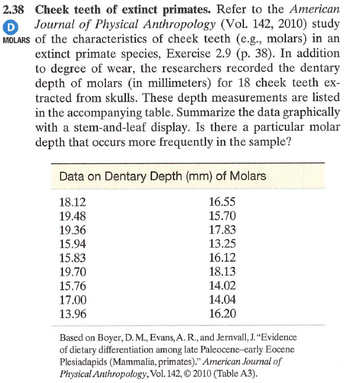
MATLAB: An Introduction with Applications
6th Edition
ISBN: 9781119256830
Author: Amos Gilat
Publisher: John Wiley & Sons Inc
expand_more
expand_more
format_list_bulleted
Question
What am I supposed to do here?

Transcribed Image Text:2.38 Cheek teeth of extinct primates. Refer to the American
D Journal of Physical Anthropology (Vol. 142, 2010) study
MOLARS of the characteristics of cheek teeth (e.g., molars) in an
extinct primate species, Exercise 2.9 (p. 38). In addition
to degree of wear, the researchers recorded the dentary
depth of molars (in millimeters) for 18 cheek teeth ex-
tracted from skulls. These depth measurements are listed
in the accompanying table. Summarize the data graphically
with a stem-and-leaf display. Is there a particular molar
depth that occurs more frequently in the sample?
Data on Dentary Depth (mm) of Molars
18.12
16.55
19.48
15.70
19.36
17.83
15.94
13.25
15.83
16.12
19.70
18.13
15.76
14.02
17.00
14.04
13.96
16.20
Based on Boyer, D. M., Evans, A. R., and Jernvall, J. "Evidence
of dietary differentiation among late Paleocene-early Eocene
Plesiadapids (Mammalia, primates)." American Journal of
Physical Anthropology, Vol. 142, 2010 (Table A3).
Expert Solution
This question has been solved!
Explore an expertly crafted, step-by-step solution for a thorough understanding of key concepts.
Step by stepSolved in 2 steps

Knowledge Booster
Similar questions
- The bus is late or my watch is fast.arrow_forwardAfter running a mile a day over a period of two weeks, the average amount of weight loss is 2.5 pounds. A dietitian, who publishes health articles in a newspaper, states their new diet program helps with additional weight loss when combining their special diet with running a mile a day over a period of two weeks. Interested in studying the dietitian's article further, you ask friends who have tried the dietitian's new program and you determine their weight loss to be 3.0 pounds in a two-week period, on average. As you set up a hypothesis test to determine if the dietitian's article is correct, what is the dietitian's claim?arrow_forwardDonna wants to give her child some cough medicine. However, she is unsure about the dosage, so she reads the directions. She notices that the dosage differs based on age. Determine the independent variable and the dependent variable.arrow_forward
arrow_back_ios
arrow_forward_ios
Recommended textbooks for you
 MATLAB: An Introduction with ApplicationsStatisticsISBN:9781119256830Author:Amos GilatPublisher:John Wiley & Sons Inc
MATLAB: An Introduction with ApplicationsStatisticsISBN:9781119256830Author:Amos GilatPublisher:John Wiley & Sons Inc Probability and Statistics for Engineering and th...StatisticsISBN:9781305251809Author:Jay L. DevorePublisher:Cengage Learning
Probability and Statistics for Engineering and th...StatisticsISBN:9781305251809Author:Jay L. DevorePublisher:Cengage Learning Statistics for The Behavioral Sciences (MindTap C...StatisticsISBN:9781305504912Author:Frederick J Gravetter, Larry B. WallnauPublisher:Cengage Learning
Statistics for The Behavioral Sciences (MindTap C...StatisticsISBN:9781305504912Author:Frederick J Gravetter, Larry B. WallnauPublisher:Cengage Learning Elementary Statistics: Picturing the World (7th E...StatisticsISBN:9780134683416Author:Ron Larson, Betsy FarberPublisher:PEARSON
Elementary Statistics: Picturing the World (7th E...StatisticsISBN:9780134683416Author:Ron Larson, Betsy FarberPublisher:PEARSON The Basic Practice of StatisticsStatisticsISBN:9781319042578Author:David S. Moore, William I. Notz, Michael A. FlignerPublisher:W. H. Freeman
The Basic Practice of StatisticsStatisticsISBN:9781319042578Author:David S. Moore, William I. Notz, Michael A. FlignerPublisher:W. H. Freeman Introduction to the Practice of StatisticsStatisticsISBN:9781319013387Author:David S. Moore, George P. McCabe, Bruce A. CraigPublisher:W. H. Freeman
Introduction to the Practice of StatisticsStatisticsISBN:9781319013387Author:David S. Moore, George P. McCabe, Bruce A. CraigPublisher:W. H. Freeman

MATLAB: An Introduction with Applications
Statistics
ISBN:9781119256830
Author:Amos Gilat
Publisher:John Wiley & Sons Inc

Probability and Statistics for Engineering and th...
Statistics
ISBN:9781305251809
Author:Jay L. Devore
Publisher:Cengage Learning

Statistics for The Behavioral Sciences (MindTap C...
Statistics
ISBN:9781305504912
Author:Frederick J Gravetter, Larry B. Wallnau
Publisher:Cengage Learning

Elementary Statistics: Picturing the World (7th E...
Statistics
ISBN:9780134683416
Author:Ron Larson, Betsy Farber
Publisher:PEARSON

The Basic Practice of Statistics
Statistics
ISBN:9781319042578
Author:David S. Moore, William I. Notz, Michael A. Fligner
Publisher:W. H. Freeman

Introduction to the Practice of Statistics
Statistics
ISBN:9781319013387
Author:David S. Moore, George P. McCabe, Bruce A. Craig
Publisher:W. H. Freeman